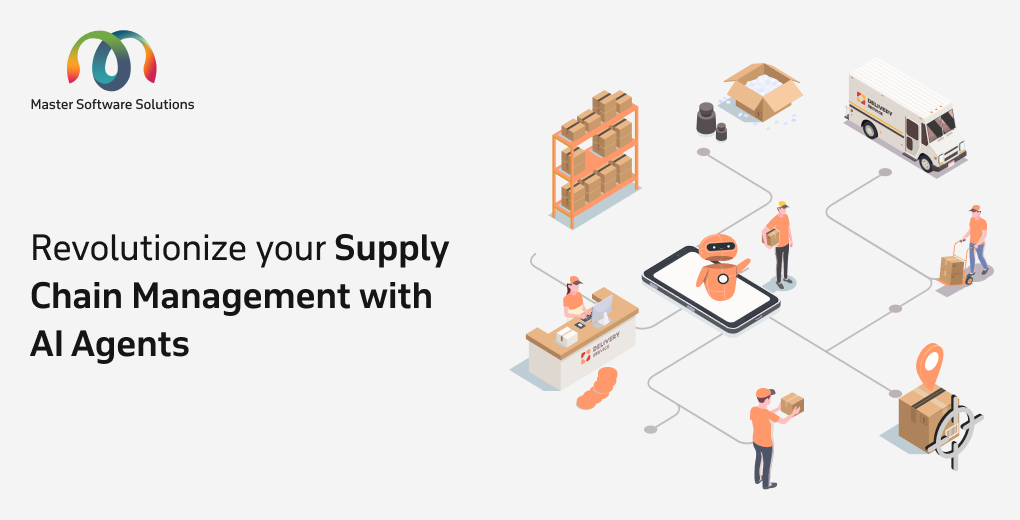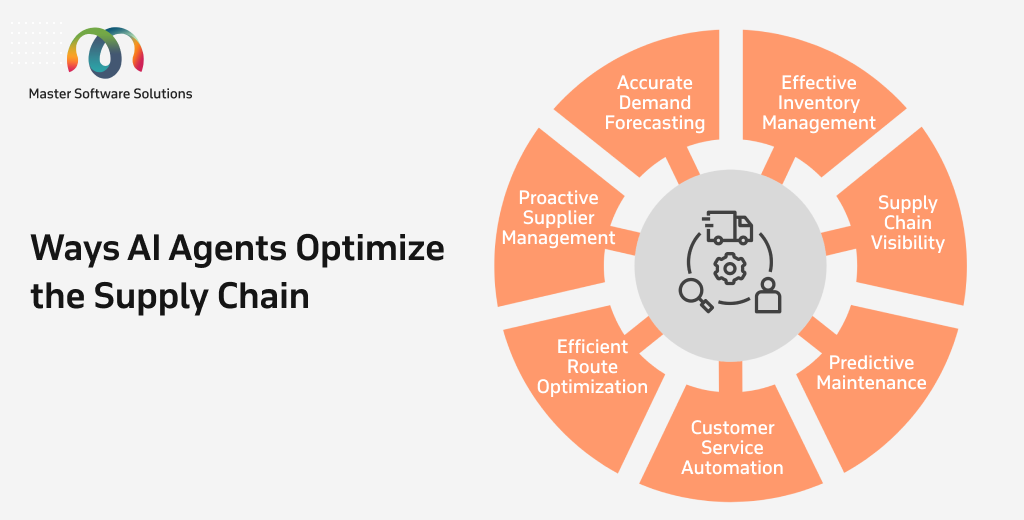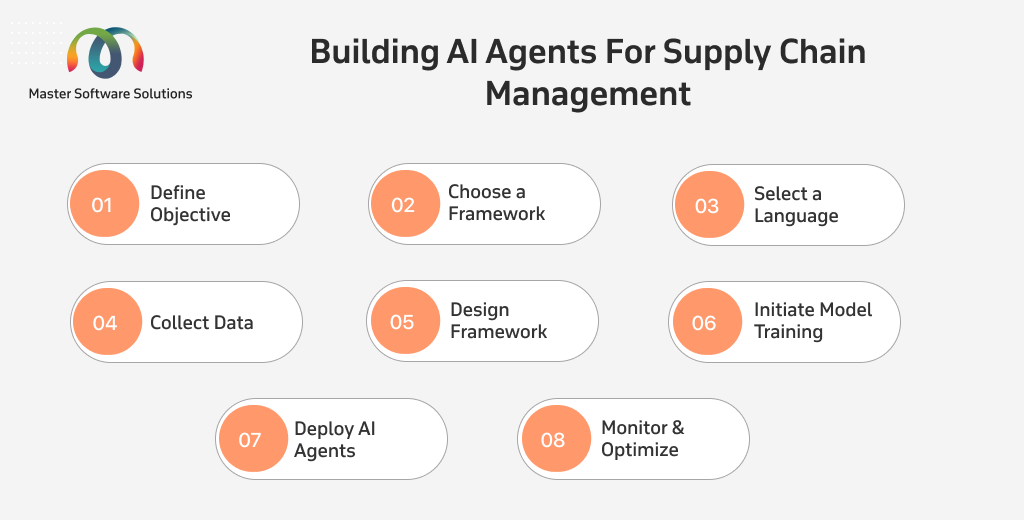It is a struggle to manage and keep up traditional supply chains in an ever-evolving and competitive market. Disruptions, fluctuating demand, rising operational costs, and the need for real-time decisions have made supply chain management more complex than ever. This is where AI agents for supply chain management come in, transforming traditional management ways.
This blog covers everything about AI agents in supply chain management and how they’ve transformed the entire supply chain.
This blog includes
What is an AI agent in supply chain management?
An AI agent for supply chain management is an intelligent software system that autonomously performs tasks, makes decisions, and interacts with other systems. They use artificial intelligence technologies, like machine learning, natural language processing, computer vision, and real-time analytics. They help businesses to manage and optimize various supply chain functions.
These AI agents are highly adaptive, unlike traditional automation tools. They can process data, learn from patterns, and respond dynamically to changes in demand, inventory levels, transportation conditions, and supplier performance.
Key components of AI agents in the supply chain
Here is a breakdown of the key components of AI agents in logistics and supply chain, structured as Input, Brain, and Action.
Input
- The AI agent gathers real-time and historical data from multiple sources to sense and understand its environment. These sources may include
- Inventory levels from the warehouse and ERP systems
- Order and shipment data from TMS (transportation management system)
- Sensor and IoT data (temperature, location, fuel consumption)
- Supplier and customer information
- External factors (traffic, weather, and geopolitical events)
- Market demand signals (POS system or customer platforms)
This input provided the AI agent with situational awareness, allowing it to make intelligent decisions.
Brain
The brain is the “core intelligence” of the AI agent, where data is processed, interpreted, and used to make decisions. It includes
- Context awareness – Understand products, suppliers, customers, and routes based on historical behavior.
- Memory & learning – Remember past outcomes and proactively improve through machine learning.
- Knowledge base – Uses rules, logistics strategies, and supply chain policies to guide actions.
- Predictive analytics – Forecasts demand, lead times, inventory depletion, or shipment delays.
- Optimization algorithms – Plan optimal routing, load distribution, and scheduling.
- Risk assessment & planning – Evaluates risks and generates mitigation strategies.
The brain enables AI agents to analyze situations, predict outcomes, and generate decisions that align with business goals.
Action
Once the AI agent makes the decision, it can interact with other systems or trigger workflows to act autonomously or semi-autonomously. These workflows or systems include;
- Reordering supplies or initiating procurement workflows
- Optimizing and dispatching delivery routes
- Rescheduling warehouse tasks or pickups
- Alerting human operators to disruptions or exceptions
- Communicating with other AI agents across the supply chain for coordination (supplier agents, warehouse agents)
- Updating systems like WMS, ERP, or CRM with the decision made
This action loop closes the cycle, allowing AI agents to continuously improve logistics and supply chain performance with minimal manual intervention.
Also Read: How Do AI Agents Work?
How do AI agents optimize the supply chain?
AI agents for supply chain management have revolutionized business operations, replacing outdated processes with automated, data-driven, and intelligent decision-making. They are highly flexible systems that adapt to ever-evolving market conditions. Ways AI agents optimize the supply chain are:
Accurate demand forecasting
Agents analyze historical sales data, market trends, seasonal patterns, and external variables, including promotions or economic indicators, to generate highly accurate demand forecasts. This enables businesses to plan production, procurement, and distribution more effectively, reducing stockouts and overstocking.
Effective inventory management
AI agents monitor real-time inventory levels across multiple locations and automatically trigger restocking, transfers, or reorder suggestions based on forecasted demand. They ensure just-in-time inventory practices, reduce holding costs, and prevent material shortages that could disrupt operations.
Supply chain visibility
Integrating data from suppliers, logistics partners, and internal systems (ERP, WMS, and TMS) with AI agents enables them to offer end-to-end supply chain visibility. They can track inventory movements, shipment statuses, and order fulfillment, allowing stakeholders to respond quickly to any disruptions or delays.
Predictive maintenance
They can monitor equipment and vehicle health using IoT sensor data. Identifying anomalies and predicting failures in advance, they can schedule maintenance before breakdown occurs. This reduces unplanned downtime, extends asset life, and ensures smooth supply chain operations.
Customer service automation
Agents can handle routine customer service tasks such as order tracking, delivery updates, and issue resolution through chatbots or automated email systems. This reduces response time, improves customer satisfaction, and frees up human staff to handle more complex queries.
Efficient route optimization
Agents can analyse real-time traffic, weather, delivery schedules, and fuel consumption data to optimize routes. This minimizes delivery times, lowers transportation costs, and improves overall fleet efficiency, especially in last-mile logistics.
Proactive supplier management
AI agents can assess supplier performance using lead times, quality, and reliability. They can analyze historical supplier behavior and market conditions to recommend alternative suppliers during shortages or delays, manage risk exposure, and negotiate better terms.
Benefits of AI agents in the supply chain
The supply chain management has undergone and is still undergoing significant transformation with the adoption of automation and AI agents. AI agents are smart solutions that enhance efficiency, accuracy, and overall operational performance. The key benefits of AI agents in the supply chain are
Improves response time
AI agents enable real-time monitoring and decision-making across the supply chain. They quickly detect disruptions, including delays, shortages, or demand spikes, and take the right actions. This fast, automated response helps maintain service levels, reduce lead times, and improve customer satisfaction.
Integrate data management
AI agents combine and analyse data from various systems, such as ERP, WMS, TMS, IoT sensors, and external data sources. This provides a unified view of supply chain operations, enhancing coordination between departments and supporting smarter, data-driven decisions.
Enhanced inventory management
AI agents proactively analyze demand trends, sales patterns, and inventory levels to ensure optimal stock availability. They reduce the risk of overstocking or stockouts, automate replenishment processes, and implement just-in-time inventory strategies, resulting in greater accuracy and efficiency.
Lowers operational costs
They can help you cut costs across multiple areas, including labor, transportation, storage, and maintenance. Agents can use predictive maintenance, route optimisation, automated procurement, and efficient resource utilisation to reduce waste, avoid disruptions, and streamline operations.
Applications of AI agents in supply chain management
You can use AI agents throughout the supply chain to allow autonomous operations without human intervention. Here are the AI agents you can integrate to improve supply chain operations.
Demand forecasting agent
Analyzes historical sales data, market trends, and external variables (seasonality or promotions) to anticipate future demand to improve production planning, procurement, and inventory allocation.
Inventory optimization agent
AI agents monitor stock levels in real-time and automate replenishment based on demand forecast and consumption rates. They can help you minimize holding costs, prevent stockouts, and maintain optimal inventory across warehouses.
Predictive maintenance agents
These agents use IoT sensor data and machine learning to detect signs of equipment wear or failure. They can proactively schedule maintenance, reduce unplanned downtime, and extend the asset’s life within the supply chain.
Route planning agents
The route planning agents optimize routes based on real-time traffic, weather, and delivery windows. It reduces fuel costs, improves delivery speed, and ensures efficient logistics execution, especially for last-mile logistics.
Merchandising agents
The merchandising agent analyzes consumer preference, market trends, and product performance to recommend what products to promote or phase out. It helps improve product placement and boost sales effectiveness.
Personal product suggestion agents
The personal product suggestion agents tailor product recommendations for B2B and B2C customers based on their past purchases, preferences, and behavior. This enhances the user’s experience and increases upselling and cross-selling.
Customer sentiment analytical agents
They monitor customer feedback across channels (social media, reviews, and support tickets) to gauge satisfaction, defect complaints, and provide insights for improving products or services.
Dynamic product pricing agents
Dynamic product pricing agents can adjust in real-time based on various factors (demand, competitors’ pricing, inventory levels, and seasonality). This ensures competitive pricing and maximizes revenue and profit margins.
Quality control AI agents
They inspect goods during manufacturing or fulfillment using computer vision and pattern recognition. Agents can detect defects early, ensure product consistency, and reduce return rates.
Re-routing the shipment AI agents
AI agents can reroute shipments dynamically and respond to real-time disruptions (road closures, delays, or demand shifts) to ensure timely delivery and avoid penalties.
Dynamic replenishment agents
The dynamic replenishment agents can forecast stock depletion across different nodes in the supply chain and trigger automatic restocking from optimal sources. This helps in reducing lead time, costs, and demand urgency.
Building AI agents for the supply chain
AI agent development requires specific skills and extensive knowledge. You can either hire your technical team or partner with an AI development company. If you are building an agent on your own, consider these requisites:
Define your objective
Identify your supply chain challenges or processes you want your agents to optimize. A clear goal will guide your design and ensure measurable outcomes.
Choose a framework
Select an AI development framework that suits your goals. You can choose among
- TensorFlow or Pytorch – Deep Learning
- OpenAI Gym – Reinforcement Learning
- Hugging Face Transformation – NLP Tasks
- Scikit-learn – Traditional ML models
Consider the complexity of the task, the scalability it requires, and the integration capabilities while choosing the right framework.
Select a programming language
Most AI development is done on Python, as it has vast libraries, community support, and compatibility with ML frameworks. You can also consider C++ or Java for edge or embedded supply chain applications.
Collect data for training
Gather and clean data relevant to your objective. The supply chain-related data may include
- Sales history and demand pattern
- Supplier lead time and delivery records
- Inventory logs and stock movements
- Shipping data and route information
- Customer behavior and sentiment data
Ensure that the dataset is accurate, diverse, and representative of real-world conditions.
Design an architectural framework
Plan the system structure of the AI agent:
- Input layer – Data ingestion from ERP, WMS, IoT
- Processing core – Machine learning or rule-based logic
- Output layer – Actions, alert, integration with other systems
- Feedback loop – Learning and performance improvement
Use microservices or modular structures to allow scalability and interoperability.
Initiate model training
Train the AI model using historical data. Apply appropriate algorithms such as
- Time-series – Forecasting
- Classification models – Defect or risk detection
- Reinforcement learning – Decision-making in dynamic environments
Evaluate your agent’s performance using accuracy, precision, recall, and F1-score.
Deploy AI agents
Implement the tailored model into your operational environment, including a supply chain management platform, a cloud-based service, or an edge device in a warehouse. Ensure that it is properly connected to existing systems.
Monitor and optimize post-deployment
Once live, proactively monitor the AI agent’s performance. Use real-time dashboards and logging tools to track decisions, system health, and KPI impact. Retrain the model regularly to ensure ongoing accuracy and relevance.
Build Custom AI agents for the supply chain industry – Master Software Solutions
Master Software Solutions is an IT-based service provider that offers end-to-end, tailored AI agent development services for diverse business needs. We offer AI consultation, AI agent development, agent integration with other systems, agent training and optimization, behavioral modeling, and deployment and scalability. Our AI agent developers have developed turnkey AI solutions that cater to supply chain management. Schedule a consultation with our AI experts.


